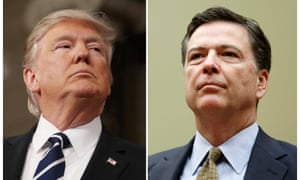Former FBI director James Comey
will testify in an open hearing of the Senate intelligence committee at
some point after Memorial Day, the committee announced Friday.
“The committee looks forward to receiving testimony from the former director on his role in the development of the intelligence community assessment on Russian interference in the 2016 US elections,” committee chairman Senator Richard Burr said in a statement, “and I am hopeful that he will clarify for the American people recent events that have been broadly reported in the media”
Senator Mark Warner, the vice-chairman of the committee, said that he hoped the testimony “will help answer some of the questions that have arisen since director Comey was so suddenly dismissed by the president”.
“He deserves an opportunity to tell his story,” Warner said in the joint statement. “Moreover, the American people deserve an opportunity to hear it.”
The testimony will be required viewing for a country rapt by the intrigue surrounding Comey’s abrupt dismissal by Donald Trump on 9 May. Though the White House initially attributed the firing to Comey’s controversial handling of the investigation into Hillary Clinton’s email server, Democrats and the press immediately suspected an effort to disrupt the FBI’s Russia investigation. Trump subsequently confirmed those suspicions in an interview with NBC News.
Many Democratic lawmakers – and a handful of Republicans – have suggested that the firing could constitute obstruction of justice.
On Wednesday, the New York Times reported that Trump had urged Comey to drop his investigation into former national security adviser Michael Flynn. The report also revealed the fact that Comey had written memos describing his interactions with Trump, which he believed were inappropriate.
Jason Chaffetz, the chairman of the House oversight and government reform committee, has asked the FBI to turn the memos over to the committee.
Comey has not spoken publicly since the firing, beyond a farewell letter to the FBI in which he wrote that he was “not going to spend time on the decision [to fire him] or the way it was executed”.
The substance of some of his memos has been leaked, however, and on Thursday Benjamin Wittes, a senior fellow at the Brookings Institution and editor of the blog Lawfare, spoke to the New York Times and published a blog post with more details about the strained relationship between Trump and Comey.
Wittes is a personal friend of Comey’s, and he described Comey as being disgusted by Trump’s efforts to gain his loyalty and establish a personal relationship, which Comey considered inappropriate.
On Friday, the New York Times revealed that Trump called Comey a “nut job” during his Oval Office meeting with Russian officials the day after the firing. “I faced great pressure because of Russia,” Trump reportedly said. “That’s taken off.”
“The committee looks forward to receiving testimony from the former director on his role in the development of the intelligence community assessment on Russian interference in the 2016 US elections,” committee chairman Senator Richard Burr said in a statement, “and I am hopeful that he will clarify for the American people recent events that have been broadly reported in the media”
Senator Mark Warner, the vice-chairman of the committee, said that he hoped the testimony “will help answer some of the questions that have arisen since director Comey was so suddenly dismissed by the president”.
“He deserves an opportunity to tell his story,” Warner said in the joint statement. “Moreover, the American people deserve an opportunity to hear it.”
The testimony will be required viewing for a country rapt by the intrigue surrounding Comey’s abrupt dismissal by Donald Trump on 9 May. Though the White House initially attributed the firing to Comey’s controversial handling of the investigation into Hillary Clinton’s email server, Democrats and the press immediately suspected an effort to disrupt the FBI’s Russia investigation. Trump subsequently confirmed those suspicions in an interview with NBC News.
Many Democratic lawmakers – and a handful of Republicans – have suggested that the firing could constitute obstruction of justice.
On Wednesday, the New York Times reported that Trump had urged Comey to drop his investigation into former national security adviser Michael Flynn. The report also revealed the fact that Comey had written memos describing his interactions with Trump, which he believed were inappropriate.
Jason Chaffetz, the chairman of the House oversight and government reform committee, has asked the FBI to turn the memos over to the committee.
Comey has not spoken publicly since the firing, beyond a farewell letter to the FBI in which he wrote that he was “not going to spend time on the decision [to fire him] or the way it was executed”.
The substance of some of his memos has been leaked, however, and on Thursday Benjamin Wittes, a senior fellow at the Brookings Institution and editor of the blog Lawfare, spoke to the New York Times and published a blog post with more details about the strained relationship between Trump and Comey.
Wittes is a personal friend of Comey’s, and he described Comey as being disgusted by Trump’s efforts to gain his loyalty and establish a personal relationship, which Comey considered inappropriate.
On Friday, the New York Times revealed that Trump called Comey a “nut job” during his Oval Office meeting with Russian officials the day after the firing. “I faced great pressure because of Russia,” Trump reportedly said. “That’s taken off.”

No comments:
Post a Comment